We’ve been conditioned to think that we are really only allowed to get 1 month of medication at a time.
But who created this arbitrary set of time?
Why couldn’t we get 3 months or 6 months’ worth of medication?
The 1 month time period is created as a number to keep you coming back for more medication and to keep you paying for medications each month.
But this time period doesn’t necessarily serve you.
What happens if you find that the thyroid medication that you rely on is suddenly unavailable?
DOWNLOAD FREE RESOURCES
Foods to Avoid if you Have Thyroid Problems:
I’ve found that these 10 foods cause the most problems for thyroid patients. Learn which foods you should avoid if you have thyroid disease of any type.
The Complete List of Thyroid Lab tests:
The list includes optimal ranges, normal ranges, and the complete list of tests you need to diagnose and manage thyroid disease correctly!
Thyroid Medication is Unique and Important
Believe it or not, this actually happens probably with a higher frequency than you suspect.
Thyroid medication can go on back-order (we’ve seen this with WP thyroid and Nature-throid).
Thyroid medication can suddenly increase in price, making it unaffordable (we’ve seen this with Armour thyroid).
It can be recalled for any reason (we’ve seen this with Synthroid and liothyronine).
It can be discontinued (we’ve seen this happen in countries like the UK).
Or any number of other reasons can occur which make it difficult or impossible to get your medication (1).
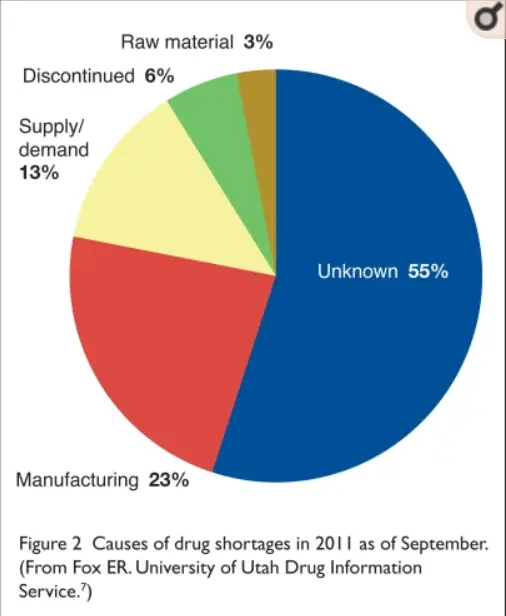
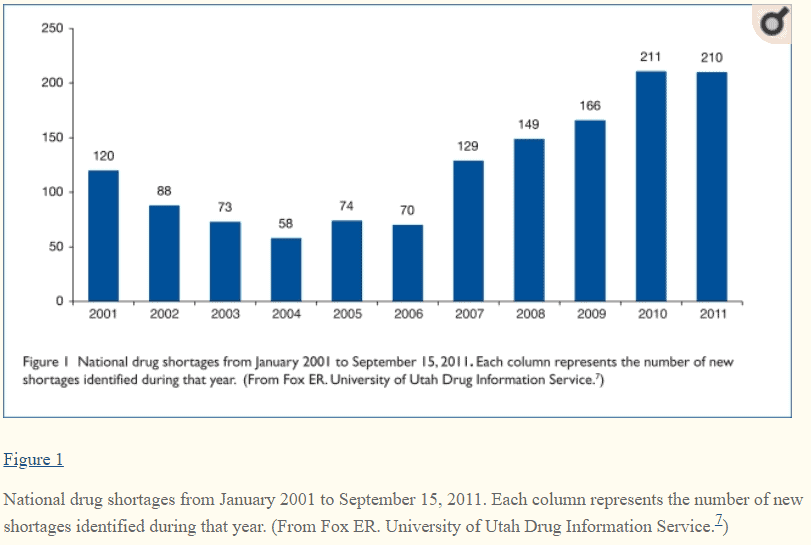
It’s not important to focus on those things which haven’t happened yet and which are out of your control, but it is important to focus on those things which are in your control.
And one of those things is to build up an extra supply of thyroid hormone in case of a rainy day.
Imagine a scenario in which you finally have found the type and dose of thyroid medication that works for you.
Then imagine (like what happened recently) that your medication was placed on backorder for 6-12 months.
During that time period, you would basically be forced to use a different type of medication that doesn’t work as well for you.
That means for 6-12 months you may have fatigue, weight gain, constipation, hair loss, and so on.
But, you could prevent this by stocking up on your medication and it doesn’t cost as much as you probably think!
What Happens if You Can’t Get Thyroid Medication?
Is being without your medication for a short period of time going to kill you?
No.
But it can potentially cause you to feel unwell and revert back to a state of hypothyroidism, even if you are just switching medications.
This problem is amplified if you have had your thyroid removed or if you have had your thyroid ablated with radioactive iodine.
People who fit into this category are much more reliant upon medication than those with run-of-the-mill hypothyroidism or Hashimoto’s thyroiditis.
They are also much more sensitive to smaller changes in their thyroid dosing because their body cannot produce thyroid hormones on its own.
Whether you have a thyroid or not, if you are taking thyroid medication then you are suppressing the pituitary release of a hormone known as TSH.
When this hormone is suppressed (or even managed), your ability to produce thyroid hormone on your own is limited.
If you suddenly stop taking thyroid medication, it takes your body a period of weeks to months to get back to a normal state.
And that ‘normal’ state is not really normal. It’s just ‘normal’ for your body.
For instance:
If you have long-standing Hashimoto’s thyroiditis (a condition that destroys your thyroid gland over time (2)) then you may only be able to produce thyroid hormone at 50% of what a healthy person can produce.
During this period without medication, you will then start to experience the symptoms of hypothyroidism.
And beyond those symptoms, there are also other costs that need to be appreciated.
- It can be very difficult to get a new dose
- The price of other medications can be much higher
- Many people may be stuck for a period of time without their medication (causing significant symptoms)
- It may cause a significant amount of stress to your body
These are just a few of the reasons why you’d want to stock up on thyroid medication.
With that in mind, let’s talk about some practical ways that you can go about doing just that.
How to Stock Up on your Medication
Stocking up on thyroid medication can be difficult but it shouldn’t be impossible.
My recommendation to you is to openly and honestly discuss why you want to have extra thyroid medication.
If you approach it this way then you will probably have success in having your doctor work along with you.
#1. Double or Triple up on your Current Dose (But Continue using your same dose)
The first, and probably easiest, way to get medication is to simply ask your doctor to double or triple your existing dose.
You don’t want to actually TAKE this dose, so don’t misinterpret what I’m saying here.
Instead, you want to take whatever your normal dose would be (even though your prescription is higher) and then keep whatever is left over as a reserve.
A practical example would look something like this:
Let’s say that you are currently using 100mcg of levothyroxine each day.
You can go to your doctor and ask him/her to provide you with a prescription for 300mcg of levothyroxine to be taken each day in 3, 100mcg tablets (they can specify this on the prescription).
You would then continue to use your 100mcg of levothyroxine each day while saving 2 tablets of the other 100mcg dose for your ‘stockpile’.
You can then rinse and repeat this process until you have 6-12 months of extra medication built up.
In this model, you should be able to get insurance to cover the majority of the cost, even though you are technically getting more than you typically need in a day.

This is the strategy that I use on my own family members to both keep the costs low (often your co-pay is the same regardless of the dose that you are prescribed!) and to allow for a reserve to be built up.
The only reason a doctor wouldn’t want to do this is that they would be worried that you would take more than you need and thus put both you and them at increased risk of negative outcomes.
So, as long as you can assure them that you will not and that you will be compliant with your existing medication dose then you shouldn’t have a problem getting it.
#2. Get a Second Thyroid Medication Prescription (For Another Medication)
Another option, although not preferred over option #1, would be to get a second prescription for a different thyroid medication.
This may be necessary if you are currently using an expensive medication or if your doctor is unwilling to increase your dose to allow you to build up a stockpile.
A practical example would look something like this:
Let’s say that you are currently taking 2 grains (135mg) of Nature-throid.
If your doctor isn’t willing to prescribe you 4 grains per day of Nature-throid then they may be willing to prescribe you an equivalent dose of levothyroxine just in case.
Even though this isn’t preferable to stocking up on your existing medication (the medication that is currently working for you), it’s still better to have something on hand instead of nothing.
In this case, you would want to get a second prescription for levothyroxine or Synthroid at 100-150mcg per day and then keep that stockpile in the event that you ever ran out of your existing medication or any other problems arise.
You could also do this for virtually any other thyroid medication (it doesn’t have to be like the example I’ve listed above).
#3. Ask for Samples
If all else fails, you may be able to get free thyroid medication by asking your Doctor for extra samples.
Doctors are often given medication samples which they can give out to patients as a way to get people to try new medications.
Doctors only have a limited supply of these samples, but it’s definitely worth asking about, especially if you can’t afford to buy extra!
Paying for Extra Thyroid Medication
The next question you should ask yourself is what will it cost?
Most insurance companies have no problem shelling out money (minus a co-pay) for a monthly prescription, but they generally aren’t generous enough to allow you to double or triple your dose.
The good news is that most of the cash prices for thyroid medications are fairly cheap even if you don’t have insurance.
But, before you can get your extra thyroid hormone you will have to make it through the pharmacist.
For whatever reason (probably because most patients do not like paying cash for medications), your pharmacist will probably tell you that you can’t fill your prescription more than once a month.
What they really mean by that statement is that you can’t fill a medication more than once a month and have insurance pay for it.
But you can definitely just tell them that you want to fill the prescription and that you are willing to pay cash for it.
This may sound crazy, but most pharmacists don’t realize that the cash price for generic medications (even if insurance won’t cover them) are incredibly cheap.
Even without insurance, you can get a 1 month’s supply of medications for around $4.00.
And this holds true for many thyroid medications as well.
This isn’t true for all thyroid medications (especially those name-brand medications such as Tirsosint), but you don’t necessarily have to build up a 1 year supply of the medication that you are currently using (more on that below).
The amount of money it will cost you to build up your supply will depend on which medication you are using.
Below you can find the average monthly cash price (assuming insurance won’t cover it) of various thyroid medications:
- Levothyroxine 100mcg cash price: $4.00 / month
- Synthroid 100mcg cash price: $11.83 / month
- WP thyroid 2 grains (135mg) cash price: $25.43 / month
- Armour thyroid 2 grains (130mg) cash price: $46.19 / month
- Nature-throid 2 grains (135mg) cash price: $12.37 / month
- Liothyronine 25 mcg cash price: $17.82 / month
- Cytomel 25mcg cash price: $17.82 / month
- Levoxyl 100mcg cash price: $13.79 / month
- Tirosint 100mcg cash price: $127.25 / month
- *Note: prices may differ in your country (these prices are based on the current rates in the United States as of 11/30/2018)
Medications Don’t Really ‘Expire’
My recommendation is to plan to get around a 1 year supply of extra thyroid medication that you can fall back on in case of an emergency.
Medications (even thyroid hormone) are exceptionally stable and can be used long after they are technically ‘expired’.
You should NOT think about the expiration of medications in the same way that you think about the expiration of food.
When food expires, it’s probably not safe to consume it.
But, when a medication expires, it still contains MUCH of its original potency despite being ‘expired’.
The expiration date on medications is there to describe a time when the medication is no longer 100% effective, but even after 15+ years of being ‘expired’ almost all medications still maintain 90+% effectiveness (4).
Put in other words:
A levothyroxine medication dose of 100mcg which is 1 year old will probably provide your body with 100mcg of levothyroxine.
A levothyroxine medication dose of 100mcg which is 15 years old will probably provide your body with an equivalent dose of around 90-95mcg of levothyroxine.
Does this mean that the expiration date is a ploy to get you to keep renewing your medications for fear that they won’t be effective?
I’m not convinced of that, but it is important to know that most medications still remain highly potent LONG after they are technically expired.
This means that you can safely stock up on thyroid medication and have it on hand for decades (or more) in case of an emergency.
And stocking up really won’t cost you that much.
The cash price of levothyroxine 100mcg (generic) is $4.00 per month at Walmart.
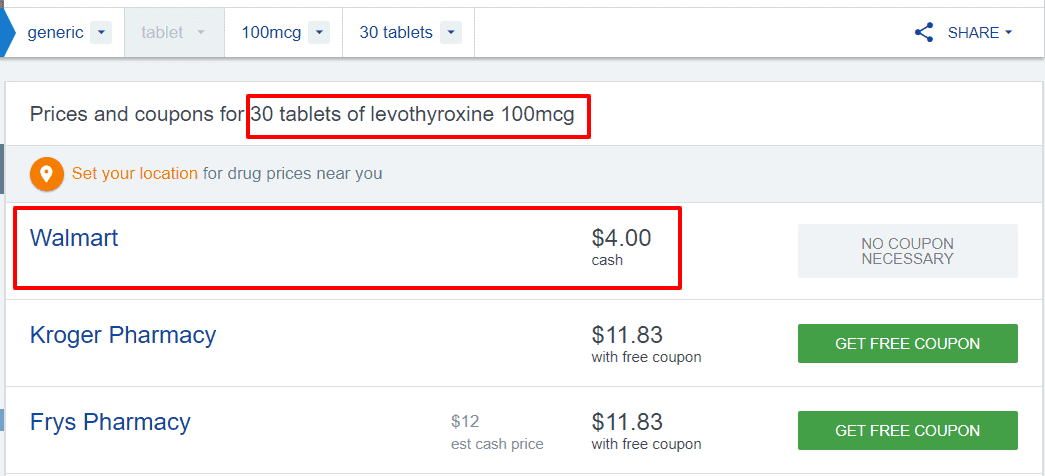
That means the cash price of stocking up for a 1 year supply of thyroid medication is only $48.00!
And if you consider that this medication will be good for at least 10 years you are only paying an average of $4.8 / year for the peace of mind to have extra thyroid medication on hand.
That’s a very reasonable deal.
You can get this cash price with a coupon code using the website goodrx.com and you can also find other coupons for thyroid medications there as well.
But what should you do if you are on another medication like WP thyroid or Nature-Throid?
Your best option is to try and find a 1 year supply of the medication that you are currently using.
If you can’t, or if your doctor is unwilling to prescribe it, then you can always get another cheaper form (like levothyroxine) as a backup medication just in case of an emergency.
While you probably won’t tolerate the new medication quite as well as your old medication it’s still better to have something rather than nothing.
Conclusion
While it may not be at the forefront of your mind, it’s important to understand that having a backup supply of thyroid medication is incredibly important.
For various reasons, your thyroid medication can be placed on recall, it can be discontinued, or it can be held up for other reasons.
In the event that any of these things happen, it’s important to have a reserve so that you can continue to function and feel well.
My recommendation is to work with your doctor to get an extra year’s supply of thyroid medication that you can fall back on in case of an emergency.
Now I want to hear from you:
Do you have extra thyroid medication on hand in case of an emergency?
How did you go about getting your extra medication?
If not, why haven’t you?
Leave your questions or comments below!
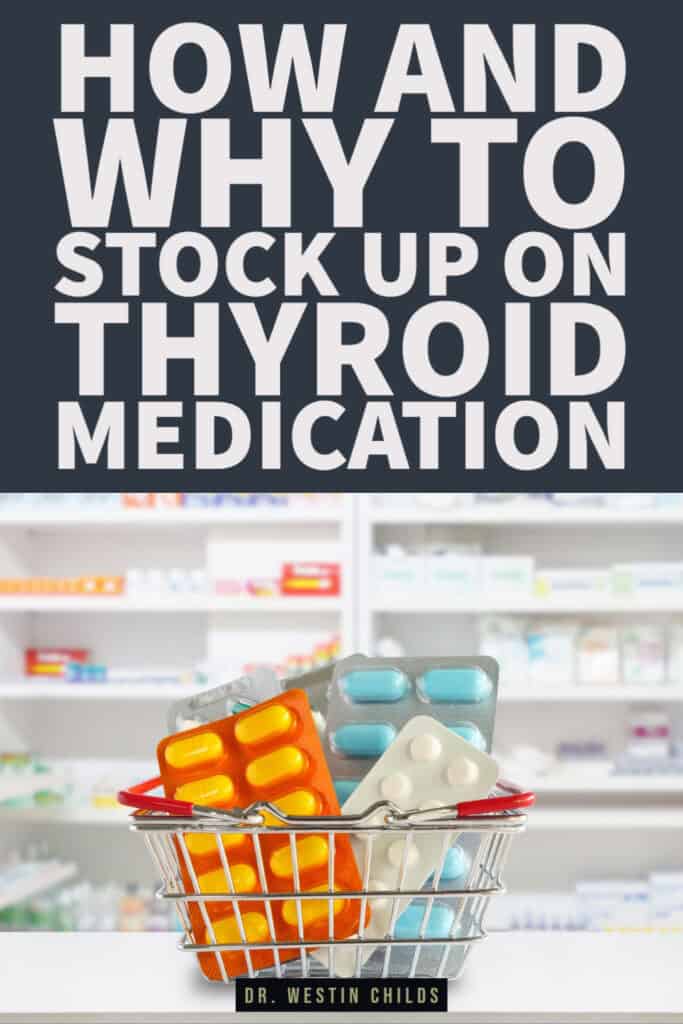
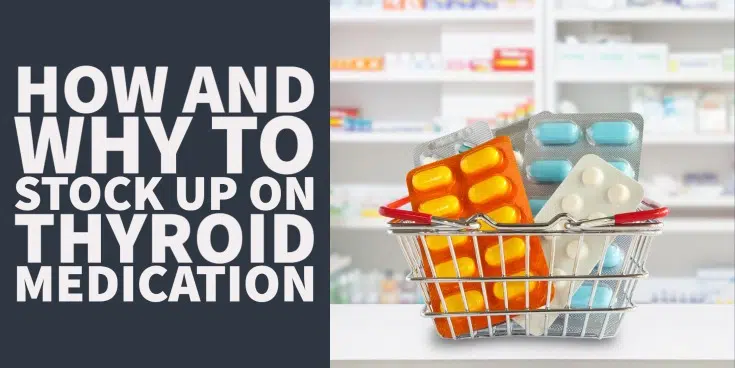







I am on 30 MG ARMOUR THYROID TABLET
and L- THYROXINE 50mcg
I am gaining weight.
What to do ?
Hi Ewa,
I would take a look at this article which explains how to lose weight if you have hypothyroidism: https://www.restartmed.com/lose-weight-hypothyroidism/
You can also find more information in my weight loss guide here: https://www.restartmed.com/hormone-mastery/
I need that medicine please
Is that the same with Carbimazole tablets for Graves’ disease
Hi Dr Childs,
I have been trying to stock up on my medications. I live in NZ and have been on T3 Liothyronine a year now. I buy T3 from a pharmaceutical compounding company in NZ – but because it is not funded it costs $250+ nzd for 3 months of tablets and I was told it expires in 6 months. However, reading this article helps.
Could you recommend a reputable company where I could buy T3 online for a cheaper price???? I have seen some online T3 Thyroid tablets for sale but I am not sure how trustworthy they are?? Is there a supplier in USA who I could buy from and would be much cheaper than in NZ?
Also, I am 100mcg of Levothyroxine and 50mcg of Liothyronine – I am struggling to lose weight 9after I had the thyroidectomy I was on much higher dose of Levothyroxine only and lost a lot of weight – but have now put it all on again.
Here are my last test results:
Free T4:10.0 pmol/L ( 7.0-16.0 )
TSH:<0.01 mU/L ( 0.3-5.0 ) L
FT3:11.8 pmol/L ( 3.6-6.5 ) H
Here in NZ they don't do RT3 testings; I had to plead with my GP to try me on T3, (my endocrinologist said it was not necessary) he's come on board with it now though.
I am eating healthier than ever, no dairy, no meat and walk an hour most days.
I eat two Brazil nuts every day for the Selenium, and have included tablet with zinc in my diet.
Hi Barbara,
Unfortunately, I don’t know any reputable online pharmacies to recommend or I would happily do so.
Should you really be advocating stockpiling medications when the world has gone mad with people doing this and hoarding groceries due to the coronavirus?
Hi Ali,
This article was written in 2018 and the information was as relevant then as it is now. You are welcome to do whatever you like with your medication but I would strongly recommend building up a supply for all of the reasons listed here. Obviously, this information isn’t mean to cause hysteria and I don’t think it comes across in that way.
Hi Dr Childs,
I recently started on NP thyroid 90MG. I have been told by a pharmacist that NP thyroid in some doses have been on bo for years. Is this a concern w my dose? Also taking 2.5 mcg SR liothyronine. Finally feeling good. Having anxiety though about getting ex med. Trying to reach out to my dr these days is very difficult, understandable. I am guessing I can’t get this w/o script?
Thanks for all you do. Wishing I live in AZ 🙂 Stay well.
Hi Dawn,
WP thyroid is much more difficult to get compared to NP thyroid which is still available.
Thank you very much for letting me know that thyroid medicine does not expire when the prescription bottle says it does.
I had switched doctors because my doctor retired. I went to a new doctor and asked for my nature-throid prescription. I still had some refills left from the previous doctor. That is how I have extra thyroid medication. I was worried about the expiration date, until now.
Thanks from me, too.
It has been a major struggle getting my correct dose of Levothyroxin. PCPs refuse to refill. When I got dropped from 1 provider they required a NEW prescription in order for a refill which causes over laps. So, I was able to keep a small supply above the monthly allowance. Which has saved my life-literally.
Here is my problem, tho, & why I appreciate your answer. On many of my bottles I find the expiration date is the same as the filled date! I use the oldest script 1st so I am not too far behind the current script.
I want to mention tho, that myxedema will kill a person. I am one who falls into that category. Without my meds I begin failing quickly.
Again, thank you for this info. It is very appreciated.
I buy NDT online and always get the largest amount possible as I’m wary of it going out of stock due to legislation changes (this has already happened once). This means I have about a year’s worth in stock. But I have often wondered about expiry dates so it’s reassuring to hear they’re probably not a cause for concern.
Thank you for mentioning GoodRx. Being in (Original) Medicare, I also have the Part D drug plan and have discovered that paying cash with GoodRx is actually cheaper than using my insurance (about 80-90% of the time) for the other medications I take!
Pharmacists have a ‘gag’ order so they are not allowed to tell you where to get the most cost effective medications. GoodRx is free and you can write your medications off on your tax whether you get them through insurance or self pay–although you cannot get credit for GoodRx in reaching the ‘donut hole’ where drugs become cheaper over all.
I also want to advise patients that pharmacy prices can vary a lot (so do your research)! So although this applies to the U.S.A., I wanted to share it because if you live on a budget, knowing these things can make a big difference.
The last tip is cutting pills in half (if it possible to do and doesn’t affect absorption). Get an Rx for double the dose and half the pill. Many doctors understand people are struggling financially and will help out.
So, Dr. Childs, I continue with your supplements and am noticing a small but incremental improvement in energy–and my vivid dreams continue (much to my pleasure). I do hope they do not affect any reoccurrence of my DCIS, but since I believe that my extra long time use of HRT was really the culprit, I am not too worried.
Thanks again for all the good information!
Hi Nancy,
Great suggestions! I am glad you also noticed that many prescriptions are actually CHEAPER if you refuse insurance and pay cash. Most people simply can’t believe that this is true and most pharmacists are surprised by it as well! And I’m glad you are seeing improvements with the supplements 🙂
I have Hashimoto’s and am hypothyroid with bouts of hyperthyroidism- Currently I’m on a dose of 50mcg of Tirosint due to malabsorption issues I had to switch from generic levothyroxine. The past month I’ve been skipping one dose a week – also I have the unused generic leftovers from when my prescription switched – I can barely afford what I take now so paying out of pocket is out of the question. I plan to ask for some samples when I go in next visit and call to see about an increase even if it’s only a month or two – but knowing my endocrinologist that is not likely to happen. So I will continue to do as I have been. I was off medication for 2 weeks after a major neck surgery and my TSH soared from 1.3 to 16.7 so I’m terrified of running out of medication. My current medication allows my TSH to run about .98 to 1.3 so I figured one dose a week won’t hurt as bad as not having meds for a couple weeks or even something more devastating. Also- my pharmacy ALWAYS has to order my medication so I have to call a few days before and ask if it’s on the shelf – so in this case I think it’s essential to have a supply of medication put back. These Days are uncharted territory and I’d rather be safe than dead.
Dear Dr. Childs,
Thanks for all the articles about thyroid imbalances, they’re very helpful.
Where would you keep a supply of levothyroxine that will expire soon. All the tablets are sealed in their packages. Is it better to keep them in a cold room like the cellar?
Thank you
Hi Nathalie,
The cooler the better for preserving medications but I wouldn’t worry too much about the expiration. Pharmaceutical companies put them there to ensure that you keep coming back to buy more medicine but, in reality, most medications (save a few) last MUCH longer than the expiration date on the label.
Thank you.
What about Euthyrox from Merck, does it keep its strength long after the expiration date?
Have a beautiful day.
Nathalie
Is the same thing true re. medication being good past the expiration date for compounded dessicated thyroid? This is the only option for porcine based thyroid now since WP, et al is on recall and they told me the prescription expires after 6 months.
I came with the same question, as I take natural desiccated thyroid (NDT) and my supply is now almost 2 years old. It’s not as effective, I regained 10 pounds and am suffering fatigue. I can only conclude NDT without the preservatives and chemicals does in fact expire more quickly.
Hi Emily,
It is more likely that your demand for thyroid hormone has changed: https://www.restartmed.com/you-cant-stay-on-the-same-thyroid-medication-dose-forever/
What are your thoughts on using Beef organ Thyroid and Adrenal complex to get off of thyroid meds? Especially now that my Favorite WP Thyroid is not available. Have you seen this be successful?
Thanks for all of the great information you provide!
Hi Sarah,
I have formulated products with both ingredients and see great results with them 🙂 It just depends on the individual, how advanced their disease is, what caused their condition, and so on.
Dr. Childs,
Thank you so much for your info on this topic. I have been fortunate to collect a small stockpile my meds, and I know that these pills (levothyroxine) hold well over time, but is there a safer way to store them than in the Rx Bottle?
For example, would it be harmful to seal the bottle with a food saver? My area is prone to flooding so I am very afraid of water damage to my stockpile, whether from a leak in the roof or a flood in the basement. If a food saver type sealed package would not work, what would be a good alternative?
This is the one prep I cannot do without as I no longer have a Thyroid.
Appreciate the help.
Ash
Hi Ash,
Unfortunately, I don’t know if using a food saver would harm or impact the medication. I think keeping it in an air tight seal and away from light/moisture would be sufficient for it to hold for a very long time, though.
I am so happy to find your site. I had a complete Thyroidectomy in 2007 and I’ve always been confused about what Thyroid Supplements would actually help me now… With the supply chain craziness getting worse, I have been recently looking for ways to build up an emergency supply. I will try your suggestions. I am still unclear whether Armour Thyroid, or Dessicated Thyroid of any kind is an acceptable replacement for Synthroid if I don’t have a Thyroid? Or is it just a supplement that helps when you do have one? Thanks so much for this info!
Hi Kristi,
Desiccated thyroid is fine as a thyroid medication if you are post thyroidectomy.
A quick note of thanks. Seems I will have to have my thyroid removed soon and one of the things holding me back is the concern about possible unavailability of the replacement hormone. The information you shared here is extremely helpful for me. Thank you.
Hi Dianne,
Glad to be of some help!
I take Tirosint, which of course is a liquid capsule. Does this medication also have a long shelf life? I’m concerned it’s shelf life may be different because it’s a liquid capsule and not a tablet. Would this be worth stockpiling, or should I try to get a more stable type of thyroid medicine? Is there a thyroid medicine that you recommend as a good alternative? I had a thyroidectomy in 2012, and have been taking tirosint since that day. My endocrinologist told me that tirosint was carefully made so each dose was always precise, and that it was free of dyes and preservatives. I would prefer to stock pile this if it is practical. It has worked well for me. I would appreciate your opinion on a comparable alternative though, just in case. Thank you for your time.
Hi Kristine,
I’m unaware of any studies outlining the shelf life of liquid thyroid medications vs tablets. My best guess is that the liquid version would be less stable than the tablet but I don’t have any information to back that up except intuition. In terms of alternatives, you could use any of the T4 medications like levothyroxine, Synthroid, or Levoxyl.
Does the same advice apply to methimazole for hyperactive thyroid? I did take the advice to have extra on hand, but the extra i stored expired in 2021… can I still use it and simply replace it with my current prescription refills as i get them?
Hi Stephanie,
Methimazole is one of those medications that you really don’t want to be on long-term. If possible, you want to do whatever you can to get off of it as quickly as possible. Please see this podcast episode: https://www.restartmed.com/podcast/how-to-prevent-thyroid-surgery-and-radioactive-iodine-ablation-therapy-dr-osansky-and-dr-childs/
This is OT, but I am interested in your views on atrophic thyroiditis. I was diagnosed with Hashimoto`s 20 y ago based on high anti-TPO and anti-TG levels. A recent ultrasound showed a completely atrophied thyroid gland which I think is called Ord`s disease and is technically not the same as Hashimoto`s. Of course, to most doctors, it makes no difference as you just take enough levothyroxine to maintain an in-range TSH. But I am wondering if you place patients with atrophied glands in the same category as Hashimoto`s patients, or rather in the same category as cancer/RAI patients? If I had to go off thyroid medication, I doubt I would be able to produce even half of the hormones I did when healthy…
Hi Anna,
An atrophied thyroid gland would put you in the same group as those with RAI/thyroidectomy as well as those with end-stage Hashimoto’s. You can learn more here: https://www.restartmed.com/end-stage-hashimotos/
This so eased my mind. It is 2023 and I have over the past year talked to my endocrinologist about what if supply is blocked. He didn’t seem to understand my concerns. I do have a 90 day supply of higher dose than I am on currently so that is my emergency backup. I have no thyroid so know I will not survive if I can’t get my synthroid.
Hi Lee Anne,
It’s definitely worth spending some time and energy to figure out how to stock up on your thyroid medication, especially if you are someone without a thyroid.
Once I stockpile my thyroid medication, how should I be storing it ?
Hi Amy,
Per the medication label, typically in a cool, dry place.
I read recently (On the NIH website) that taking 7 times your daily thyroid replacement, once a week, has no impact on its effectiveness. I have had scripts for 175mcg for 24 years, and about 5 years ago decided it was no longer necessary to do THC suppression. Now I take the same tablets only 4 days a week, and I feel fine. And I’m building a nice stock of tablets to use in just such an emergency.
Hi Dave,
If you are feeling no difference on 4 doses per week instead of 7 then there may be a chance you are someone who doesn’t need to be on thyroid medication at all. You can learn more here: https://www.restartmed.com/do-you-have-to-take-thyroid-medication-for-life/